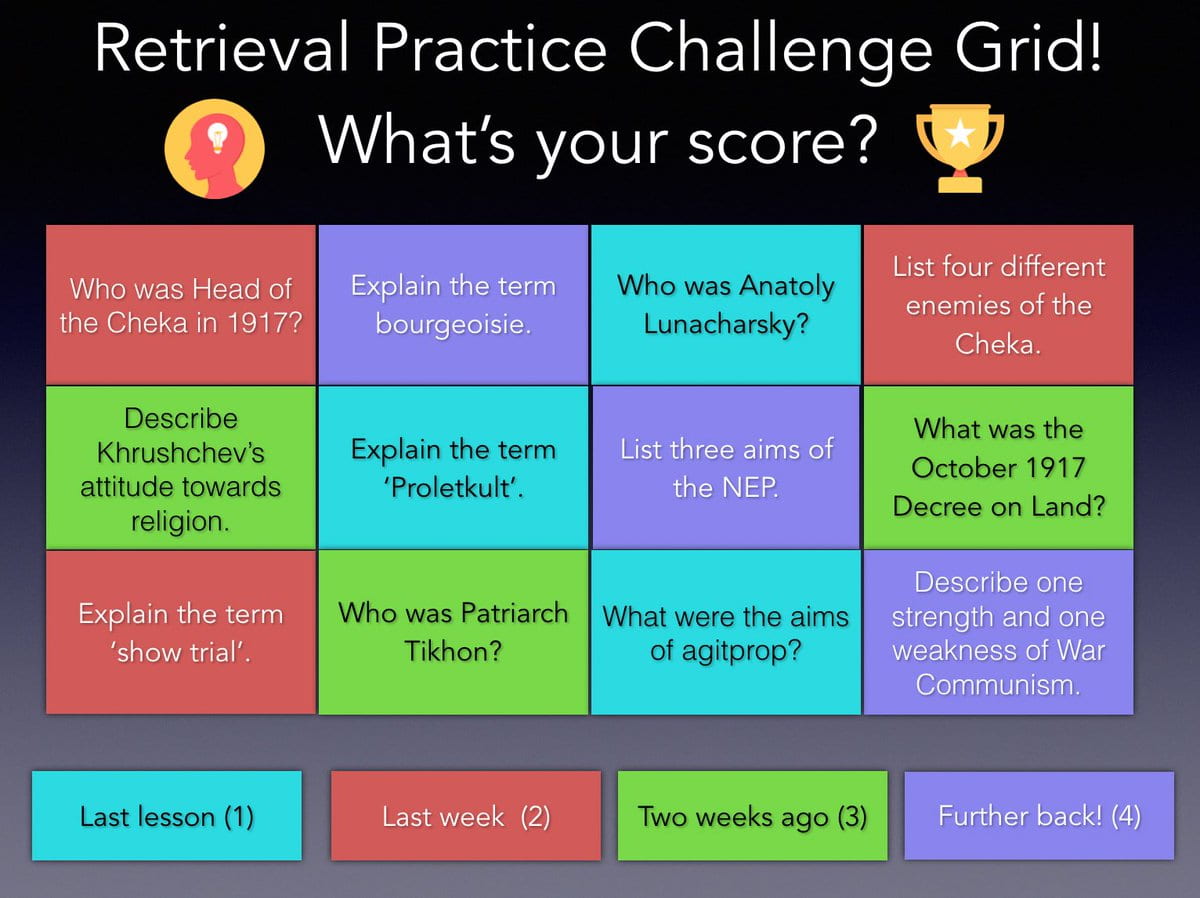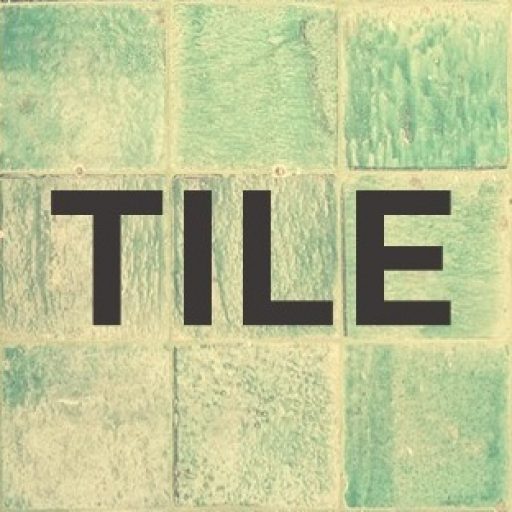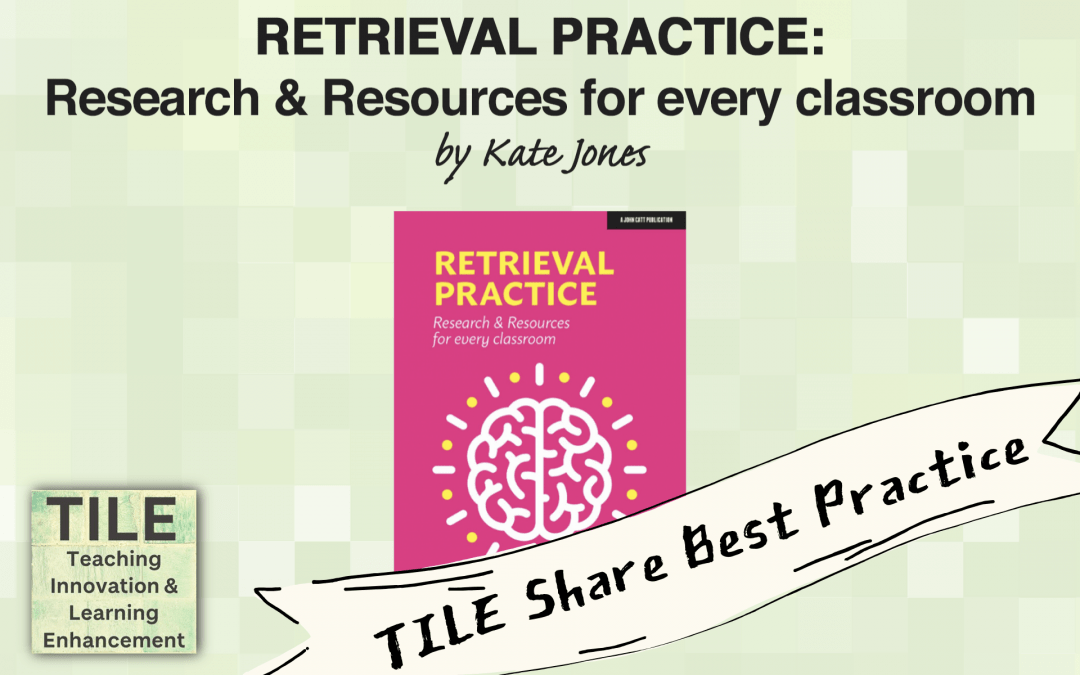We are delighted to be able continue our ‘TILE Share Best Practice’ series by inviting Kate Jones to talk about her expertise on Retrieval Practice: Research and Resources for every classroom. One of her methods, the Retrieval Practice Challenged Grid, was already mentioned in Dr Flávia Schechtman Belham’s talk when discussing resources to facilitate student’s learning, so we are excited to learn more about her teaching resources. Many thanks to Kate for sharing her best practice!
TILE Share Best Practice
Retrieval Practice: Research and Resources for every classroom
by Kate Jones
This session will focus on retrieval practice – the cognitive science with research/evidence I have found useful and informative plus recommended reading: books and research summaries. I will also include a range of classroom examples of retrieval practice and how they have worked in my classroom with my students and outside of the classroom.
There will be several examples where students are required to retrieve information about specific topics then visit their peers to see if they can add more information and also show students’ what they forgot to include. These tasks are called Cops and robbers, Retrieval relay race and Quiz, quiz, trade. All templates are available to download for free from my TES page and all very self-explanatory.
Here are some further classroom resources for implementing retrieval practice:
The Retrieval Practice Challenge Grids combine retrieval and spaced practice. There will be a grid (you can decide the amount of boxes/questions you include) and in each box will be a question. Questions are colour coded and linked to points. Questions based on content from last lesson are worth one point, questions based on material from last week are worth two points and basically the further back the questions the higher the points achieved.Templates for Retrieval Practice Challenge Grids can be found here.

The Retrieval Practice Placemat can be printed and used in lessons or projected onto the board. It provides a series of questions and prompts for students to verbally retrieve information about previously covered material. This is a very flexible resource that can be used across different subjects, topics and age ranges. For more information there is a blog about this resource I created by US educator Blake Harvard you can read here
https://theeffortfuleducator.com/2019/06/16/lfqinc/

The aim of a Revision Clock is to break down a topic into smaller manageable chunks with the aim to spend five minutes per section. This is a very good revision activity for students that struggle with time organisation or can feel overwhelmed. This also provides an opportunity to combine retrieval and spaced practice. This resource was originally created and shared by Becky Russell on Twitter @Geogblog.

The online quizzing tools that I highly recommend are Quizizz, Plickers and Google Forms.
Kate’s students demonstrate that these techniques work for them:
“I think that a combination of different revision techniques helped me to do as well as I did. Reading through the textbook and rephrasing in my own words was useful for me because I personally found it tested my comprehension of the information and how I could simplify it in a way that was easier to remember. I believe retrieval practice was one of the most useful techniques because it draws from your memory and constantly exercises the thought process that is the same as the actual exam. Retrieval is good as it shows where you need to focus your revision and for someone who struggles with how to begin revision, I found this very useful.The combination of using retrieval practice and answering past exam questions were very beneficial for me. Retrieval helped me understand historical events and contextualising the topic. Answering the past exam papers was also useful as it improved my subject knowledge. Completing past papers showed how much depth was required and understanding how to actually answer the question was important too. ‘Not only was retrieval useful, but the repetition of using it in our lessons generally at the beginning of every lesson we would answer retrieval questions, helped keep previous lessons in memory so that key information would not be forgotten. Regular retrieval meant it didn’t actually feel as though I was doing as much work as I was. I didn’t need to revisit everything again at the end of the course because I had been doing that throughout the two years.”
by Student Lauren Ashworth
Further readings recommend by Kate Jones
https://www.retrievalpractice.org/why-it-works
https://www.learningscientists.org/
https://www.amazon.com/Make-Stick-Science-Successful-Learning/dp/0674729013
https://www.amazon.co.uk/Love-Teach-Research-Resources-Classroom/dp/1911382950
More about Kate Jones

Kate Jones is Head of History at The British School Al Khubairat, in Abu Dhabi, United Arab Emirates. Kate is also the author of Love To Teach: Research and Resources for every classroom (2018) and her second book Retrieval Practice: Research and Resources for every classroom will be published in 2020. For more information about Kate’s ideas and to read her blog visit lovetoteach87.com. You can also subscribe and listen to her podcast The Love To Teach Podcast. On social media, she can be found on Twitter @87history and on Instagram @lovetoteach87.


Recent Comments